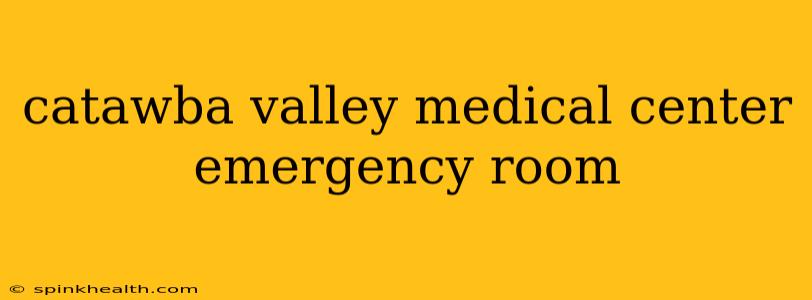Catawba Valley Medical Center (CVMC) is a vital part of the Hickory, North Carolina community, providing comprehensive healthcare services. Its emergency room, however, often faces the spotlight, particularly during times of heightened need. This comprehensive guide aims to provide you with all the information you need regarding the CVMC emergency room, from understanding when to visit to navigating the process once you arrive.
Imagine this: it’s a Tuesday evening, and your child takes a nasty fall, scraping their knee and crying inconsolably. Or perhaps you wake up with sudden, sharp chest pain. These are scenarios where immediate medical attention is crucial, and that's where the CVMC emergency room steps in. But knowing when to seek emergency care versus visiting an urgent care facility or your primary care physician can be confusing. Let's delve into the specifics.
When Should I Go to the Catawba Valley Medical Center Emergency Room?
The CVMC ER is designed for handling serious and life-threatening medical emergencies. Consider visiting the ER if you experience:
- Life-threatening conditions: Severe bleeding, difficulty breathing, chest pain, stroke symptoms (sudden weakness or numbness), severe allergic reactions, loss of consciousness, etc. These require immediate intervention.
- Severe injuries: Major trauma from an accident, deep wounds requiring stitches, severe burns, broken bones with significant deformity, etc.
- Sudden, severe illness: Severe abdominal pain, sudden high fever, intense headaches, etc., particularly if worsening rapidly.
What if My Condition Isn't Life-Threatening? What are My Alternatives?
Many conditions don't require the immediate intervention of an emergency room. Understanding the difference is crucial:
What is the difference between an Emergency Room and Urgent Care?
This is a common question, and the distinction is vital. Urgent care centers handle non-life-threatening conditions requiring immediate but not emergency-level care. Think of things like minor injuries (sprains, cuts), colds, flu symptoms, or infections. Urgent care facilities typically offer shorter wait times and lower costs compared to an ER visit.
Should I go to Urgent Care or my Primary Care Physician?
If your condition is not urgent, your primary care physician is your best resource for non-emergency medical needs. They are familiar with your medical history and can provide personalized care. Urgent care is a good option when your PCP isn't available, or you need immediate attention for a non-life-threatening issue.
What Can I Expect When I Arrive at the Catawba Valley Medical Center Emergency Room?
Arriving at the ER can be stressful, but knowing what to expect can alleviate some anxiety. Upon arrival, you will be assessed by triage nurses to determine the severity of your condition. This prioritizes patients based on their need for immediate care. You may have to wait, but be assured that the staff is working to attend to everyone as efficiently as possible. Be prepared to provide your insurance information and medical history.
What are the Costs Associated with a CVMC Emergency Room Visit?
The cost of an ER visit can vary greatly depending on the services rendered. It is advisable to have health insurance to help cover these expenses. If you're uninsured or underinsured, inquire about financial assistance programs available at the hospital.
What are the Visiting Hours at the Catawba Valley Medical Center Emergency Room?
The CVMC emergency room operates 24/7, offering continuous care for emergencies.
How Can I Prepare for My Visit to the CVMC Emergency Room?
Preparing for a visit can ease the process. Gather essential information such as your insurance card, a list of your current medications, and any relevant medical history. Having a trusted person accompany you can also provide support during your stay.
The Catawba Valley Medical Center Emergency Room plays a crucial role in the community. By understanding when to visit and what to expect, you can navigate urgent medical situations more effectively and receive the timely care you need. Remember, if you're ever unsure, it's always better to err on the side of caution and seek immediate medical attention.

